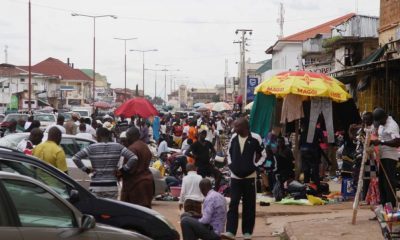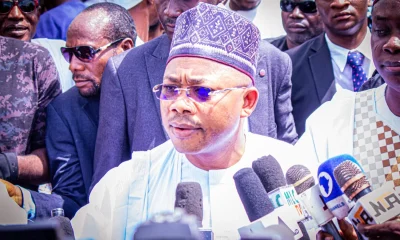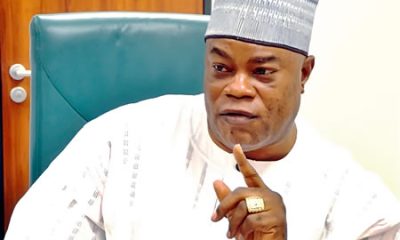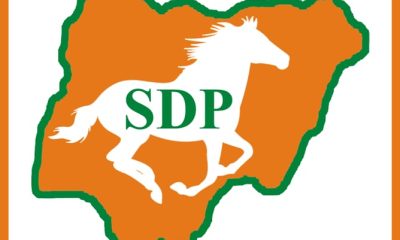BUSINESS
NICON Insurance Interim Board Assumes Duty Amid Tight Security

By Tony Obiechina, Abuja
The new Board of the National Insurance Corporation of Nigeria better known as NICON Insurance formally took over the reins of power with its maiden Board Meeting at the Corporation’s head office in Abuja on Monday, amidst tight security.
This is sequel to the approval the new board and management of NICON Insurance Limited and Nigeria Reinsurance Corporation (Nigeria Re) by the National Insurance Commission (NAICOM).
According to a statement by AMCON Head of Corporate Communications Department, Mr Jude Nwauzor, the change is to enhance the smooth running, efficient and effective management of the two firms.
“The reason for the changes in the board and management of the two insurance firms is sequel to the takeover of the major investor’s interests in the two organisations by the Asset Management Corporation of Nigeria (AMCON), and the Bureau for Public Enterprises (BPE) is working in partnership with AMCON to bring the much-needed stability in the operation of the organisations”, he stated.
Addressing NICON management staff, led by the Deputy General Manager (DGM), Corporate Advocacy, Mr.Kunle Adewale, the interim Board Chairman, Alhaji Lamis S. Dikko who led other Board members called for cooperation with the Board to reposition the insurance company which he described as a national legacy.
He said the meeting was a prelude to last Friday’s meeting of the Board where far-reaching decisions, including the immediate termination of the appointments of the erstwhile Managing Director and Executive Directors of the insurance company were taken.
Dikko said the mandate of the new Board is to preserve NICON Insurance as a going concern until a new investor comes aboard as the previous owner had woefully failed to sustain and maintain the organisation.
He said all staff that were desirous to stay back and work for the good of the organisation had nothing to fear but to support the new board to turn around the fortunes of the company.
In a statement by the Head of Public Communications, Amina Tukur Othman on Tuesday, the Director General of the Bureau of Public Enterprises (BPE), Mr. Alex A. Okoh, also a board member, lamented the decay at the place and said it was one of the few bad cases of privatisation in the country.
He regretted that the enterprise which was a going concern before privatisation was grossly mismanaged and appealed to the management and staff to collaborate and cooperate with the Board on its rescue mission to bring NICON insurance to operational vibrancy and on a pedestal to divest again.
Also speaking, the interim Managing Director, Mr. John Abuh Oyidiih charged the workers to cooperate with the Board and management to reclaim the lost glory of the insurance company “which is an institution and can’t be allowed to go down”, adding that “you do not need to hold an allegiance to any individual but the institution”.
It would be recalled that the Board members had arrived the company’s premises as early as 7:30am but could not gain access to the Board Room as it was under lock while the only functional elevator in the building was shut down. It was not until some of the Management workers sauntered in as from 8:00am that the elevator was eventually switched on and the Board Room opened and cleaned up for the Meeting.
NICON Insurance was privatised in 2005 with the core investor having 70% shares with the Federal Government retaining 30 percent. The Federal Government shares were later diluted but the fortunes of the company continued to decline with most of the assets used as collateral to collect loans from banks.
This prompted the Asset Management Corporation of Nigeria (AMCON) to take over affairs of the company, a decision the core investor went to court to challenge. The court ruled in favour of AMCON but the investor went on an appeal which the court asked the parties to maintain the status quo leading to Monday’s take over by the new Board.
Meanwhile, the new board of NICON Insurance Limited has Mr Lamis Shehu Dikko FIoD as Chairman, Dr. Henry Uko Ationu, ACIIN as Managing Director/Chief Executive Officer and Mr John Abuh Oyidih FCA ACIIN as Executive Director, Finance & Admin. The insurance firm also has Mr Alexander Ayoola Okoh, the Director-General of Bureau for Public Enterprises (BPE) as Non-Executive Director and Mr Ahmed Dahiru Modibbo FIBA ACIS as Non-Executive Director (Independent).
Similarly, the board and management of Nigeria Reinsurance Corporation has Mr Mela Audu Nunghe SAN as Chairman, Mr Olugbenga Falekulo ACII serves as Managing Director/Chief Executive Officer and Mr Olusegun Ilori FCA ACIIN comes in as Executive Director, Finance & Admin. Mr Alexander Ayoola Okoh, the Director-General of Bureau for Public Enterprises (BPE) comes in as Non-Executive Director while Mrs Yvonne Isichei MIoD, FCIB joins as Non-Executive Director (Independent).
According to the AMCON statement, the reconstitution of the board and management team of two insurance institutions in Nigeria is to ensure that the firms continue in their quest for transparent and accountable management of insurance in the country, and continue to deliver value to its stakeholders.
NICON Insurance Limited, which is one of Africa’s leading Insurers in the country was originally owned by the Federal Government of Nigeria. The Corporation was established by Decree No.22 of 1969 (now Cap 263 law of 1990 as amended) with the main objective of assisting in the development of the insurance industry in Nigeria and specifically to ensure that Federal Government assets and property are fully protected by way of insurance.
However, consequent upon the commencement of the second phase of the Federal Government Privatisation Policy, NICON Insurance was privatised in December 2005. With an asset base of N46.9bn gathered over a 50-year period of operation, many branches, and regional offices, it is therefore modest to classify NICON as a colossus in the insurance and other financial services sector.
Nigeria Reinsurance Corporation on the other hand was established under the Nigeria Reinsurance Corporation Act No. 49 of 1977. It commenced operations on January 1st, 1978, as Nigeria’s flag reinsurer, wholly owned by the Government of the Federal Republic of Nigeria. In 2002, the Corporation was transformed from being a Federal Government wholly owned Corporation to a privatised company with the government retaining some shares.
The Corporation, which has over 40 years of operations is in the business of assuming risks, providing reinsurance services and risk management solutions to its clients.
BUSINESS
Electricity Supply Better off before Privatization – Consumers

Torough David, Abuja
Many electricity consumers in the Federal Capital Territory (FCT), said that electricity was more regular when it was being managed by the Federal Government.
The consumers, who reside in Kubwa, Kuje, Lugbe and Gwagwalada spoke in Abuja on Wednesday.
They said that the privatisation of the power sector was a good idea, but added that it was not working as they enjoyed more hours of supply when it was managed by Power Holding Company of Nigeria, (PHCN).
Privatization of the sector in November 2013, was an initiative of the Federal Government to transfer ownership and management of power assets to private entities.
The move was to improve efficiency, attract more investments, and enhance overall electricity supply.
Eleven Electricity Distribution Companies (DisCos) and six Generation Companies (GenCos) were formed after the sector was privatised.
However, the transmission arm of the sector was retained by the Federal Government.
The consumers said that electricity was more regular when it was managed by the government before privatisation of the sector.
Benjamin Okorie, a Civil Servant residing in Kubwa said that his area does not enjoy power supply for six hours in a day.
Okorie said that when PHCN was managing the power industry before the unbundling of the sector, it was stable and regular.
“I thought the unbundling of the sector into generation, transmission and distribution was to improve power supply.
“But from what we are experiencing now, it is getting worse by the day and we are paying more for electricity,’’ he said.
Maria Manza, a businesswoman also residing in Kubwa said that power supply was epileptic in her area.
Manza said that the area had been experiencing low shedding of power for more than three months, adding that some days they don’t even get supply.
Jonathan Onoja, resident in Lugbe, Federal Housing said that power supply was not regular in his area, adding that they hardly enjoy up to eight hours supply in a day.
According to him, with the privatisation of the power industry into three segments, I thought electricity will improve.
“With the privatisation of the power sector, I thought government was doing consumers a huge favour but to my greatest surprise electricity has not improved,’’ he said.
Julius Omogiafor, a businessman residing in Gwagwalada said that electricity was better off under government management.
Omogiafor said that when PHCN was in charge of power, it was more regular than when it is now managed by three bodies.
| ReplyReply allForwardAdd reaction |
BUSINESS
Small Business Owners Lament High Cost of Doing Business

Some business owners in the Federal capital Territory (FCT), have expressed concern over the high cost of doing business presently.
According to them, they are also experiencing low patronage as many residents can no longer pay for goods and services like before.
The business owners said on Wednesday in Abuja, that the cost of doing business was making life extremely difficult for them.
They said increased transportation, cost of living, inflation, and weakened purchasing power were some of the challenges affecting their businesses.
At the Apo Fish Market, Agnes Nwafor, a foodstuff dealer, said the current economic situation had dampened the usual weekend buzz.
“People who usually come to my shop to do bulk purchases no longer do that anymore. People now buy goods per time depending on their needs.
”So many others who come around enquire about the prices of the items and end up not picking anything,” she said.
Sani Abdul, a vegetable seller at the Apo market said he had cultivated the attitude of selling almost below his cost price just to turn-over and attract more customers.
He lamented that most of his customers now purchased things on credit paying up in two or three installments depending on the amount.
”With the low influx of customers to the market today, one will think that this is not even weekend.
“Some of my co-traders in the market sell a dust bin basket of tomatoes for between N10,000 and N12,000 but I sell for N9,500, just to attract customers.
“Most customers who come to the shop either want the price of the items slashed or want to buy the product on credit and I do not blame them,” he said.
He urged the government to come to the aid of citizens and find a lasting solution to the increasing cost of doing business in the country.
Ekaite Obong, who runs a restaurant at the Gudu market area, also decried high cost of doing business and poor sales.
Obong said:” it seems like the sales keep dropping every day, every week and every month. We are not making sales anymore due to high cost of products.
”Purchasing some food items now is like acquiring gold. Even items which the price ordinarily is supposed to decrease due to its season of cultivation have not declined.
“Thus, making the cost of food high, because we have infused a little profit to our sales. So I do not blame the customers who don’t turn out in mass at all.”
Obong urged the government to tackle inflation and strengthen the naira to reduce the cost of imported goods.
“We also need policies that help local farmers and producers too. If food items are affordable, cost of food will reduce and I am sure we will get more patronage,” she said.
Similarly, Chinedu Umeh, who runs a fabric store said the situation in the country had affected both his wholesale and retail business.
“The economy is biting hard, cost of transportation is killing our businesses. The government really needs to look into this area and find a lasting solution,” he said.
Umeh suggested tax relief for small businesses and better access to credit financing to help cushion the impact of reduced sales.
“Small businesses are the engine of the economy, but we are sinking. Government must listen to us, and come to our aid,” he said.
Owoicho Ameh, who owns a farm along airport road, also decried the high cost of doing business and low sales.
Ameh said: “it is no longer business as usual for us these days as the cost of chicken feed, electricity and even transport is challenging our business.
“We struggle with these factors even with our little resources, yet, at the point of sale, customers are either not willing or able to buy.
“This is because, when we factor in our cost of production, it leads to increased cost of the birds, making many customers not able to afford it.”
Ameh said on several occasions, he sold his birds at giveaway prices, just to make sales and get funds to take care of family responsibilities.
He lamented that if he continued in that manner, he may likely go out of business in the nearest future and become jobless.
“The government sincerely needs to take urgent steps to improve the economic climate, improve infrastructure and boost the people’s confidence.
“If this is not given immediate attention, the rate of suicides is bound to increase in the country and the number of jobless citizens will increase,” Ameh said.
BUSINESS
FG Inaugurates CNG Buses to Boost Staff Welfare

The Federal Government has reiterated its commitment to institutional performance and staff welfare with the inauguration of Compressed Natural Gas (CNG) buses at the Federal Ministry of Finance in Abuja
This was contained in a statement by the Director, Information and Public Relations of the ministry, Mohammed Manga.
Meanwhile, the Minister of Finance and Coordinating Minister of the Economy, Wale Edun, while inaugurating the buses, announced the reintroduction of essential provisions for the staff.
Edun described the move as part of a broader push to energise the ministry’s workforce and improve operational efficiency.
He said that the ministry’s internal strength was vital to delivering Nigeria’s broader economic reform agenda.
“This ministry is the engine room of national transformation and that engine must be well-fuelled,’’ he said.
He said that the buses were acquired under the presidential initiative on CNG, which intends to ease staff transportation while advancing the country’s shift to cleaner, cheaper energy sources.
The minister said that the initiative aligned with the ministry’s values of fiscal prudence, transparency and environmental responsibility.
Edun underscored the critical role of staff welfare in delivering Nigeria’s economic reform agenda.
He announced the revival of monthly welfare provisions to staff, a practical gesture aimed at fostering morale and stability as the ministry leads the charge on macroeconomic reform.
The Permanent Secretary of the Ministry, Lydia Jafiya, urged the staff to remain committed, disciplined and professional as the ministry continues to steer the country through a period of economic transition.
“As the country pursues tough but necessary policy shifts ranging from treasury digitalisation to market stabilisation, the ministry’s internal unity and external credibility remain pivotal to achieving inclusive growth and restoring investor confidence,” she said.
Jafiya also commended the minister’s leadership and hard work.
The Chairman of the Presidential Initiative on CNG, Ismaeel Ahmed, reiterated the programme’s mission to mainstream cleaner transport across government institutions and stimulate local industrial value chains.
| ReplyReply allForwardAdd reaction |































